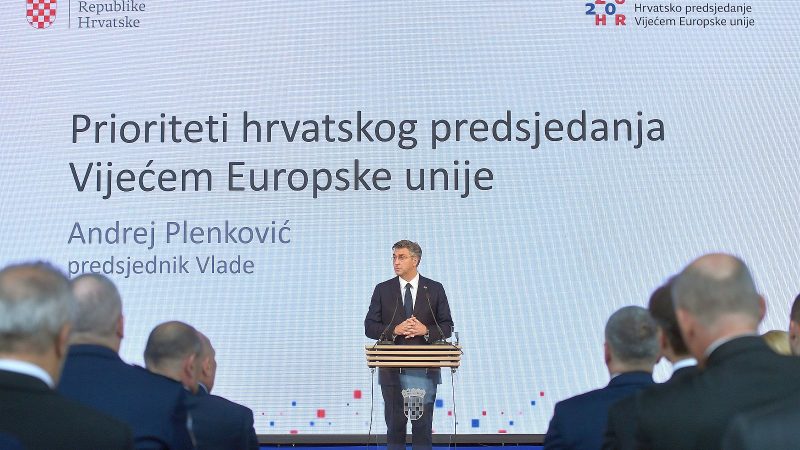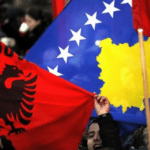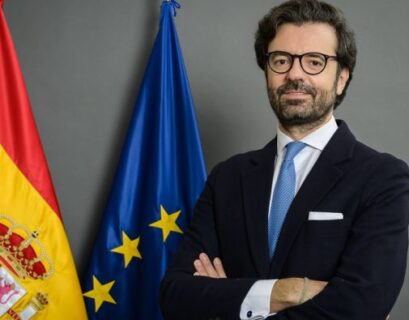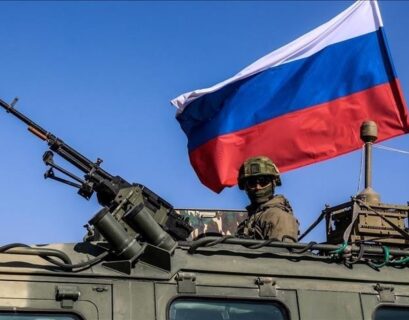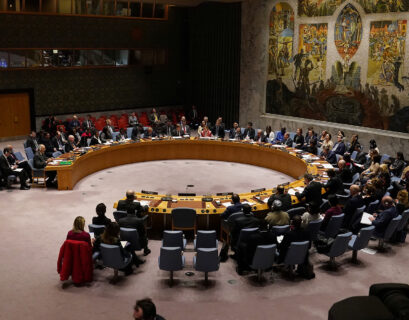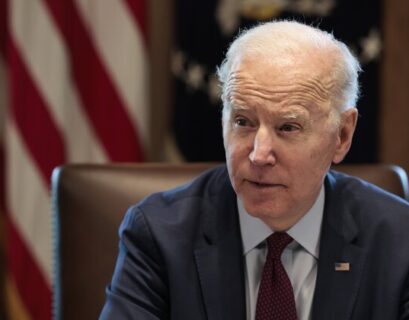SANDRO KNEZOVIĆ
Just six and a half years after its historic entry into the EU, Croatia faces another historical challenge in the first half of 2020 – the Presidency of the Council of the EU. Given the track-record of recent Croatian political history, this development is of paramount importance for the country and beyond. The very fact that it is happening, has an indelible mark on modern history of the Republic of Croatia and its role in the wider regional and European affairs.
It is interesting indeed to observe the factual reversal in political practice of the country in the recent period. In the period between 2000 when the Stabilization and Association Process was introduced and 2013 when the country joined the club, Croatia performed as a country that was de facto receiving directives from Brussels to take the accession process to the next level. In other words, the process of accession talks was entirely about negotiating the way to implement predefined acts and regulations, rather than negotiating about their substance. Today, we are dealing with a country which directly influences the formulation of EU policies, to the extent that is realistic, taking into account rather limited capacities and leverage.
Besides that, the impact of using European structural funds in the post-accession period to the EU started to change the country dramatically, especially in the field of transport infrastructure development. While the efficiency of usage of the aforementioned funds is still below the desired level, the numbers are showing a concrete benefit for Croatia’s economy in the post-accession period – Croatia has pulled over twice as much funds as it paid into the EU budget in the last 6 years.
This, of course, represents just one of the concrete benefits connected to the EU membership. Besides from benefits, the membership also brings specific responsibilities, where the Council presidency represents just one of those outstanding ones.
The Presidency of the Council of the EU is the great opportunity for the youngest member of the EU to prove maturity and to contribute to the success of defining and implementing the EU policies. It is an ideal opportunity for the Republic of Croatia to show the capacity for active membership by pursuing energetic policies as the member state ‘behind the steering wheel of the EU’, instead of merely following the development of events defined by ‘big players’ in the club, i.e. bandwagoning.
Therefore, again, the rotating presidency of the Council of the EU is a great opportunity for a less influential member states to ‘punch above their weight’. Their success will depend exclusively on their capacity to manage successfully the entire endeavor and in particular to wisely articulate their priorities and build coalitions for their implementation.
On the other hand, some issues and trends cannot be directly influenced. The contemporary environment in which the Croatian Presidency of the Council of the EU is held is unprecedented and therefore it is not just celebratory and ceremonial. Not only that the EU’s geo-strategic environment is very challenging, but the EU itself is loaded with great challenges.
Above all, international relations are in a period of widespread deregulation and the concept of multilateralism ‘as we know it’ is in a serious crisis. The realpolitik is becomingincreasingly relevant at the expense ofthe constructivist approach in international relations. This is also reflected in the functionality of the EU with its constructivist approach to international relations, based on concepts of soft power, smart power and peaceful coexistence. Also, the EU is struggling with few outstanding internal challenges that are determining the context in which Croatia’s EU Council Presidency is taking place.
First of all, Brexit – in words of a cynical poet, the misty island has finally sailed off, but not entirely – the transition period lasts until the end of the year and a major challenge will be to negotiate a trade agreement in just 11 months. UK Prime Minister Johnson has already stated that he does not want an extension of this period. The time will tell how realistic this can be and what can be done to avoid trading based on the rules of World Trade Organization (as with a third country) after the new year. It should be emphasized here that a trade deal is only one segment of the negotiating framework. Much remains to be agreed – issues such as intelligence co-operation (conditions for the exchange of confidential information), air safety, pharmaceutical product attestations and many others are also waiting to be resolved. Therefore, Brexit had a major impact on policy development in the EU before, but also during and after the Croatian Presidency of the Council of the EU.
Another issue was the transition of political structures in Brussels. Until the very beginning of the presidency chairmanship, the EU did not have the Commission and the President of the Council, while the new convocation of the European Parliament had many difficulties in the beginning of its work – especially in the process of political legitimation of the Commission members themselves.
In direct correlation to this, even more important question for the future and the functioning of the EU is the multiannual financial framework for 2021-2027, or the EU budget, which is still in the negotiation phase, burdened with many conceptual disagreements and difficulties. Basically, there are two groups of countries with opposing views and interests – (1) less developed members (including the Republic of Croatia), so-called Friends of Cohesion, who seek to strengthen cohesion policy in order to reduce the gap in the level of development within the EU and (2) more developed countries who oppose it, with an explanation that they want to invest in advanced technologies, the Green Deal, European security, etc.
When it comes to European security, the EU has not found itself in such a problematic environment for a long time. The current US administration’s attitude towards the EU is unprecedented, as well as towards important global challenges that have direct consequences for the EU (e.g. Iran nuclear deal, climate change…). More aggressive Russian and Chinese policies vis-a-vis the EU, but also in Southeast Europe, have a substantial impact on level of success of EU policies, as well as its legitimacy. There are also the challenges of financing advanced policies such as the Green Deal, the introduction of new technologies such as 5G, the rise of the populism and Euroscepticism in Europe, etc.
And last but certainly not least, the recent out-brake of coronavirus crisis that had paralyzed the entire globe and will have paramount impact on the world economy. This emerged after the priorities are set. Therefore, it did not impact their formulation, but it is already having a direct impact on every day’s life of the entire EU and hence it directly affects their implementation.
Therefore, it is an environment where the Republic of Croatia needs to define its priorities and try to contribute to their implementation. There are 4 general priorities defined:
A Europe that develops – A priority here is sustainable development of the European economy. First of all, more balanced regional development of all members – cohesion. Within this, the emphasis is not only on economic development, but also on ensuring a better standard for all European citizens, with a direct link to the demographic challenges which most of the EU members face nowadays (aging population, brain drain…);
A Europe that connects – Connectivity is ‘the buzzword’ of this priority. The focus will be on the networking of modern technologies, infrastructure, especially IT infrastructure – 5G. An emphasis here is also on balanced development across member countries as a precondition for sustainable development;
A Europe that protects – The focus here is the security of the EU and all its citizens, as well as its fundamental values (freedom and rights). A great emphasis is placed on improving the fight against terrorism and organized crime, protecting and improving the existing internal affairs and justice systems, as well as protecting the Schengen area.
An influential Europe – The focus is on strengthening the position of the EU in the contemporary international relations, improvement of the Common Foreign and Security Policy of the EU, especially its defense component, empowerment consolidation policies in the direct neighborhood – Eastern Partnership and enlargement in the WB6. Given the position of the Republic of Croatia and its interest in long-term stabilization in the neighborhood, a special focus is naturally on enlargement. Therefore, the big EU-WB Summit is scheduled (May 2020), with the idea to bring new dynamics to the stalled WB6 EU accession. The expectations are high – during the Croatian Presidency of the Council of the EU the idea is to correct the mistakes made to Albania and especially Northern Macedonia and to open accession negotiations with them. Intensive activities are taking place in this direction. The European Commission adopted a new proposal for an enlargement policy framework – which should put an end to French reservations and blockades – and a broad political consensus has been achieved at the EU level to make new steps in this field.
The is great symbolism in the aforementioned. Twenty years ago, in Zagreb, for the first time the prospect of EU accession has been opened to the countries of the region and the Stabilization and Association Process was launched for all countries, Croatia included. Today, twenty years after that, during the Croatian Presidency of Council of the EU there is an opportunity to give new momentum for further EU enlargement in the region.
Of course, desires are one thing, and real politics something else. It is obvious that the enlargement has not been a high-level topic and was not seriously discussed in the EU for many years. This is precisely one of the key reasons why this policy has been halted for quite some time. In addition, this is why in this region we can increasingly see the influence of some other actors who are not keen on the idea of further EU enlargement, not to mention the one of NATO Alliance.
It is already evident that these actors are developing a serious capacity to cement their positions in the region and their direct influence on political and economic processes in this part of Europe. On the other hand, it is evident that pro-European forces in the region are increasingly losing legitimacy, which is a direct consequence of the blocked enlargement process.
On that track, one could conclude that it is high time for both sides in the process to invest more, in order to finally unblock it. Despite all the difficulties and the slowness of the EU accession process, this is still the only rational scenario for the long-term consolidation of the Southeast Europe and successful finalization of the major European project.
Sandro Knezović Ph.D, Institute for Development and International Relations, Zagreb, Croatia


